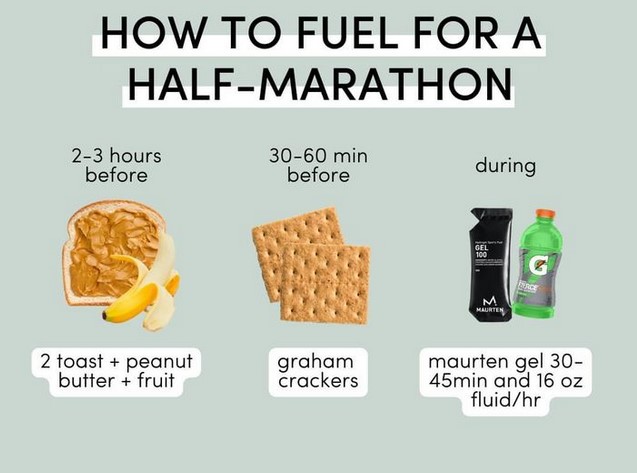What Not to Do before the Marathon?
Do not skip your training and neglect nutrition before the marathon. Taking proper care of your body and preparing adequately are essential for a successful race.
Marathons can be physically demanding, requiring months of training and careful preparation. To optimize your performance and minimize the risk of injury, it’s crucial to avoid certain actions and behaviors leading up to the event. Neglecting your training and nutrition undermines your chances of success on race day.
Training not only improves your physical endurance but also prepares your mind for the mental challenges ahead. Similarly, maintaining a balanced and nutritious diet fuels your body with the energy it needs to perform at its best. We will explore some key things to avoid before a marathon to ensure you are fully prepared on race day.
:max_bytes(150000):strip_icc()/should-i-eat-before-a-run_crop-b26a78232eb54403a518e71c4f39e2aa.jpg)
Credit: www.verywellfit.com
Ignoring Proper Training
Before a marathon, it’s crucial to prioritize training to ensure a successful race day.
Skipping Long Runs
Avoid skipping long runs to build endurance and mental strength for the marathon distance.
Neglecting Speed Work
Include speed work in your training schedule to improve your pace and overall race performance.
Trying Something New
When it comes to marathon preparation, one important rule to remember is to avoid trying something new on race day. This applies to everything from diet and nutrition changes to new gear or shoes. Experimenting with unfamiliar foods or footwear before the race can lead to unforeseen issues, causing unnecessary stress and potentially hindering performance. To ensure a successful marathon experience, it’s best to stick to what you know works for your body and your running routine.
Diet And Nutrition Changes
When preparing for a marathon, maintaining consistent and familiar eating habits is key. It’s essential to fuel your body properly with the right nutrients and keep it in an optimal state for running. Trying out new diets or making significant changes to your nutrition plan shortly before the race can have detrimental effects on your performance.
Instead, focus on consuming a well-balanced diet consisting of lean proteins, complex carbohydrates, and healthy fats. Make sure to include plenty of fruits, vegetables, and whole grains to provide the necessary energy for training and recovery.
Avoid experimenting with trendy diets or supplements without proper guidance and consultation from a qualified nutritionist or dietitian. What works for one person may not necessarily work for another, so it’s essential to find a nutritional approach that suits your individual needs and supports your marathon training.
New Gear Or Shoes
When it comes to marathon running, your gear and shoes play a crucial role in ensuring comfort and preventing injuries. However, trying out new gear or shoes right before the marathon can lead to various problems. Ill-fitting shoes can cause blisters, discomfort, or even more severe foot and leg issues, which can significantly impact your race performance.
It’s always recommended to train for the marathon using the gear and shoes you plan to wear on race day. Running in them regularly gives you an opportunity to break them in, get accustomed to their fit and feel, and make necessary adjustments if needed. This way, you’ll be able to identify any potential problems and make informed decisions about your gear well in advance.
If you’ve been considering trying out new gear or shoes, save it for after the marathon. Post-race recovery period offers an ideal opportunity to explore and experiment with different options, without the risk of disrupting your performance.
Ignoring Rest And Recovery
Prioritizing rest and recovery before a marathon is crucial for peak performance. Ignoring this can lead to fatigue and potential injury, affecting your race day. It’s essential to incorporate sufficient rest and recovery into your training plan. This ensures that your body is fully prepared and optimized for the marathon.
Rest and recovery are crucial aspects of marathon training. Yet, many runners make the mistake of ignoring these essential factors. Overtraining and lack of sleep can lead to poor performance and even injury on the big day.
Overtraining
Overtraining can be detrimental to your marathon preparations. Pushing your body too hard without allowing ample time for rest can result in fatigue, decreased performance, and a higher risk of injury. It’s important to strike a balance between training and recovery.
Lack Of Sleep
Sleep plays a vital role in preparing your body for a marathon. It is during sleep that muscles repair and strengthen. However, many runners underestimate the importance of quality sleep in their training regime. Lack of sleep can negatively affect your energy levels, mood, and cognitive function.
Here are a few reasons why you should prioritize sleep:
- Improved Recovery: Sleep promotes the release of growth hormones, facilitating muscle repair and recovery from training.
- Enhanced Performance: A well-rested body and mind are better prepared for the physical and mental demands of a marathon.
- Reduced Injury Risk: Fatigue from lack of sleep can lead to poor form and decreased coordination, increasing the likelihood of injuries.
To ensure you get sufficient rest, make sleep a priority and establish a consistent sleep schedule. Aim for 7-9 hours of quality sleep each night.
Remember, the marathon is a test of endurance, and your body needs time to recover and adapt to the training stimulus. Ignoring rest and recovery can have a detrimental impact on your performance and overall marathon experience. So, prioritize rest, get enough sleep, and give your body the time it needs to excel on race day.
Ignoring Hydration And Nutrition
Skipping proper hydration and nutrition preparation can significantly impact your marathon performance. It’s crucial to pay attention to your body’s needs leading up to the race to ensure you are adequately fueled and hydrated.
Skip Hydration Plan
Without a hydration plan, you risk dehydration during the marathon, which can lead to fatigue and decreased performance.
Ignoring Race Day Nutrition
Disregarding your race day nutrition can cause a lack of energy and hinder your ability to sustain your pace throughout the marathon.
Not Planning For Race Day
Not Planning for Race Day can have a significant impact on your marathon performance. It’s crucial to address potential pitfalls head-on and make the necessary preparations to ensure a successful race day experience.
Failing To Familiarize With Course
One common mistake runners make before a marathon is failing to familiarize themselves with the course.
This can lead to unexpected challenges and can significantly impact performance during the race.
Not Having A Race Strategy
Another critical aspect of planning for race day is ensuring that you have a clear race strategy.
Without a well-thought-out plan, you may struggle to pace yourself effectively and could run into difficulties later in the race.

Credit: tritrainingharder.com

Credit: www.reddit.com
Frequently Asked Questions On What Not To Do Before The Marathon?
What Shouldn’t You Do Before A Marathon?
Avoid trying new foods, intense workouts, excessive hydration, or alcohol consumption before a marathon. Stick to your routine for best performance.
What Should I Do 24 Hours Before A Marathon?
In the 24 hours before a marathon, follow these 5 steps: 1. Rest and get enough sleep to conserve energy. 2. Hydrate well by drinking water and electrolyte-rich fluids. 3. Eat a balanced meal that includes carbohydrates for fuel. 4.
Avoid trying anything new, like new foods or gear. 5. Visualize success and stay positive to mentally prepare.
What Not To Do The Night Before A Race?
Avoid these activities the night before a race: consuming large meals or new foods, excessive alcohol consumption, staying up too late, intense physical activities, and trying out new gear or shoes. Stick to your routine and ensure rest and proper hydration.
Conclusion
Remember, preparation is key. Avoid new foods and gear changes. Proper rest and hydration are crucial. Stick to your training plan. Don’t overexert yourself on race day. With these tips in mind, you’re setting yourself up for success on marathon day.
Good luck on your journey to the finish line!







